- News
- Reviews
- Bikes
- Accessories
- Accessories - misc
- Computer mounts
- Bags
- Bar ends
- Bike bags & cases
- Bottle cages
- Bottles
- Cameras
- Car racks
- Child seats
- Computers
- Glasses
- GPS units
- Helmets
- Lights - front
- Lights - rear
- Lights - sets
- Locks
- Mirrors
- Mudguards
- Racks
- Pumps & CO2 inflators
- Puncture kits
- Reflectives
- Smart watches
- Stands and racks
- Trailers
- Clothing
- Components
- Bar tape & grips
- Bottom brackets
- Brake & gear cables
- Brake & STI levers
- Brake pads & spares
- Brakes
- Cassettes & freewheels
- Chains
- Chainsets & chainrings
- Derailleurs - front
- Derailleurs - rear
- Forks
- Gear levers & shifters
- Groupsets
- Handlebars & extensions
- Headsets
- Hubs
- Inner tubes
- Pedals
- Quick releases & skewers
- Saddles
- Seatposts
- Stems
- Wheels
- Tyres
- Health, fitness and nutrition
- Tools and workshop
- Miscellaneous
- Tubeless valves
- Buyers Guides
- Features
- Forum
- Recommends
- Podcast
feature
Is there anywhere cyclists are required to be licensed, and how has it gone in the past?
Licences, registration and even number plates on bicycles have been the talk of the UK cycling community these past few weeks ever since the likely soon-to-be-replaced Transport Secretary's comments about toughening the law on bike riders were published on the front pages of national newspapers.
And while his interest in number plates on bikes was short-lived and has since been backtracked on, it got us thinking — is there anywhere in the world that requires, or has required in the past, cyclists to be licensed?
United Kingdom
Let's start closest to home...
Until a couple of months ago the idea of cyclists needing to be licensed to use the roads was little more than a social media 'debate' occasionally worthy of an airing on morning TV or radio talk shows.
As recently as December, the Department for Transport said there were "no plans" to implement a formal registration system for cyclists, saying the costs of introducing such a system would "outweigh the benefits".
Grant Shapps' comments relit the spotlight on the issue, but were followed by backtracking on number plates for cyclists. The then Transport Secretary, who was out of a job once Liz Truss became Prime Minister, suggested a toughening of the rules for cyclists would be considered as part of the current review that may see a causing death by dangerous cycling law introduced.
Thankfully, nothing came of it and the debate has gone away for a while.
United States and Canda
City planner and urban mobility expert Brent Toderian explained the licensing discussion "pops up every once in a while in North American cities, usually fuelled by conservative talk radio. It gets a little bit of fire and heat for a week or so and then goes away".
"As those who are actually informed on the issue point out all the reasons why it's far too expensive, won't work, and would be detrimental to actual stated public goals. Usually the conversation is initiated by the same people who would rather see fewer bikes and less safe bike infrastructure," he told us.
With legislation changing from state to state and even more locally, PeopleForBikes explained there are some parts of North America where licensing (of sorts) is required.
"Hawaii residents need to register their traditional and electric bicycles, but they are not required to have a licence," the group told us.
Permanent registration costs $15 and is applicable for anyone aged 18 or over. Bikes registered in another state do not need to be registered again in Hawaii.
"Several cities in Northern California have them, and many places in Florida require bike registrations. We thought Salt Lake City, and Utah in general, had one but perhaps that's changed — it's vague on the Salt Lake City website as to whether or not it's required.
(CC BY-NC-ND 2.0 license by BeyondDC:Flickr)
"Montgomery County, a huge county in Maryland outside of Washington D.C., only repealed its bike registration requirements in 2020. Lots of places have repealed them but every year somewhere new tries to introduce them under the pretence of raising funds (because they often cost money) or helping identify lost bikes when they're stolen. It's my personal opinion that they do far more harm than good though."
Australia
Perhaps surprisingly considering the library of strict laws and hefty penalty fines that cyclists Down Under can find themselves on the receiving end of, Australia does not require bike riders to be licensed.
As Brent pointed out is the case in the United States, Australia also has semi-regular calls for some form of licensing, most recently in 2014 when New South Wales Roads Minister Duncan Gay unsuccessfuly pushed for a cycling licence to be introduced.
Instead, he upped the fines for rule-breaking cyclists.
Netherlands
Oh come on, this is the home of the sensible approach to cycling as a form of sustainable and cheap transport, you weren’t really expecting the Dutch to make everyone register their bikes, were you? No, in the Netherlands, registration and licensing is not required.
And before we turn to another country, it is good to remind ourselves that Holland hasn’t always been brilliant for cycling. Amsterdam was once ruled by the car, but with some decent leadership, things have changed over the past 50 or so years to create a city that, by all accounts, is a very nice place to live.
Denmark
One place where bikes do have to be registered, is Denmark. This is, however, not a customer requirement, but something that the manufacturers must take care of.
The Danes have a 'VIN-system', introduced in 1942, which gives all bicycles a unique code embedded into the frame. It is illegal to sell frames in the country without a VIN and insurance companies refuse to pay out on stolen bicycles without one, but the system is more of an anti-theft measure than a registration.
Switzerland
Cyclists in Switzerland used to need a CHF-5-10 vignette sticker on their bikes for insurance purposes, however this began to be phased out in 2012. While being a registration scheme it was also to force riders into obtaining third-party liability insurance.
Support for the system waned at the turn of the 2010s as it was acknowledged that the cost of the scheme was outweighing the benefits.
Having baulked at the price of a beer there, we’ve learned that if the Swiss think something is too expensive then it most definitely is.
Japan
[CC licensed image by neekoh.fi:Flickr]
Japan remains the most prominent current example of a major nation requiring citizens to register their bikes and, after purchasing a bicycle, riders are legally obliged to register their machine.
Registration costs around £3 and is often done as the bike is purchased, with a form including personal details submitted. Upon completion a small sticker can be added to the bike. It's worth noting again, as with Denmark's VIN, the registration is primarily an anti-theft measure.
North Korea
And finally the one you've all been waiting for...
Up until 1992, bicycles were banned in the capital, Pyongyang, although even with the ban lifted the cost is far out of reach for many. Cyclists in the country reportedly must get a license to use their bikes, pass a road safety test and register their bicycle.
Then again, given the lack of information that gets out of North Korea, we’re really not sure whether the licencing requirement is still in place.
So yes, in short, were the UK to go down the path of requiring all cyclists to register their bikes or obtain a licence, North Korea might just be the closest comparison...
Dan is the road.cc news editor and joined in 2020 having previously written about nearly every other sport under the sun for the Express, and the weird and wonderful world of non-league football for The Non-League Paper. Dan has been at road.cc for four years and mainly writes news and tech articles as well as the occasional feature. He has hopefully kept you entertained on the live blog too.
Never fast enough to take things on the bike too seriously, when he's not working you'll find him exploring the south of England by two wheels at a leisurely weekend pace, or enjoying his favourite Scottish roads when visiting family. Sometimes he'll even load up the bags and ride up the whole way, he's a bit strange like that.
Latest Comments
- chrisonabike 6 min 41 sec ago
Tier scooters - When visiting Keynsham I found several apparently dumped (not all at once - could have been the same ones? )...
- mdavidford 11 min 14 sec ago
The answer to this is to have no friends.
- mdavidford 17 min 16 sec ago
To be fair to Attenborough, he doesn't appear to actually have any involvement in or have offered any particular support for the campaign. A child...
- hawkinspeter 1 hour 32 min ago
What's that? A mobile home for squirrels?
- Backladder 2 hours 4 min ago
While original sash windows are nice they make it very hard to keep the house warm, we eventually went for upvc double glazed sash window...
- Andrewbanshee 3 hours 27 min ago
As you said the pedals will be hidden anyway. My shoes, 3 pairs of them, have reflective strips on the heel and my winter trousers do too on the...
- Steve K 3 hours 28 min ago
Other drivers only care about disabled people when it gives them a way to object to cycling infrastructure.
- mark1a 11 hours 32 min ago
I'll put you down as a no then.
- chrisonabike 16 hours 58 min ago
Well if you *can* interview the original riders at all surely they worked, at least?...
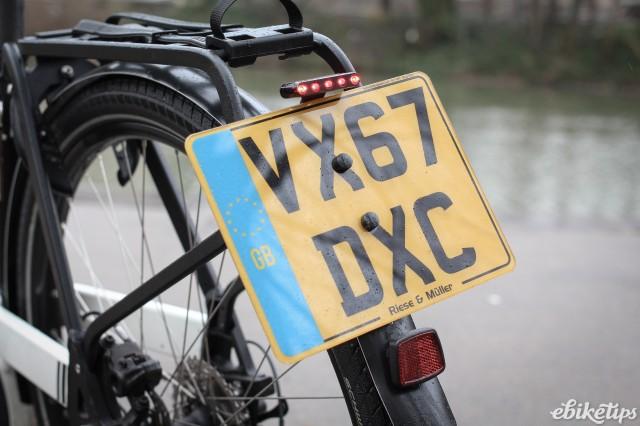
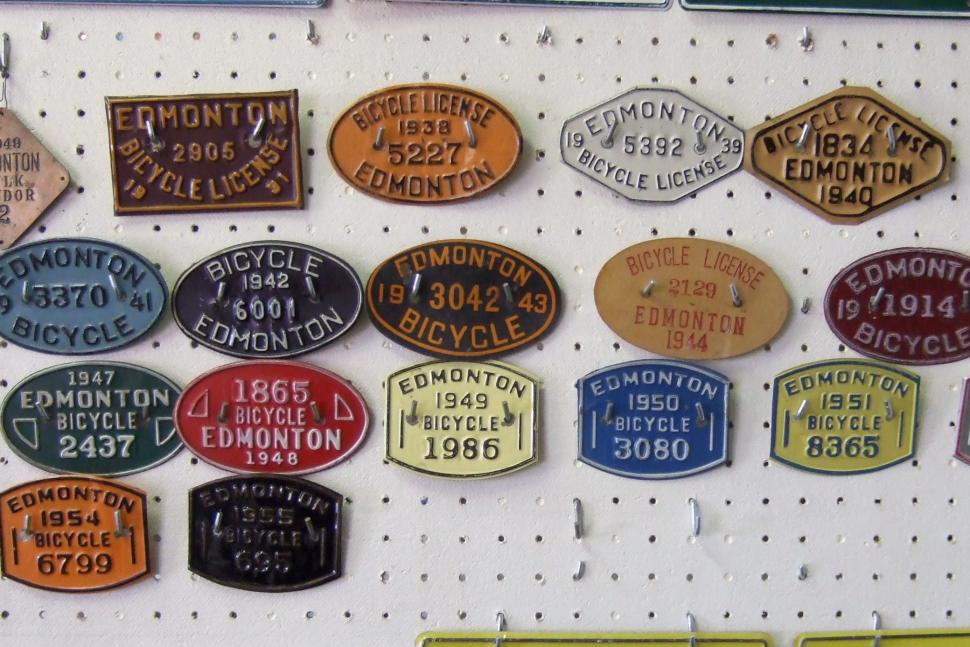
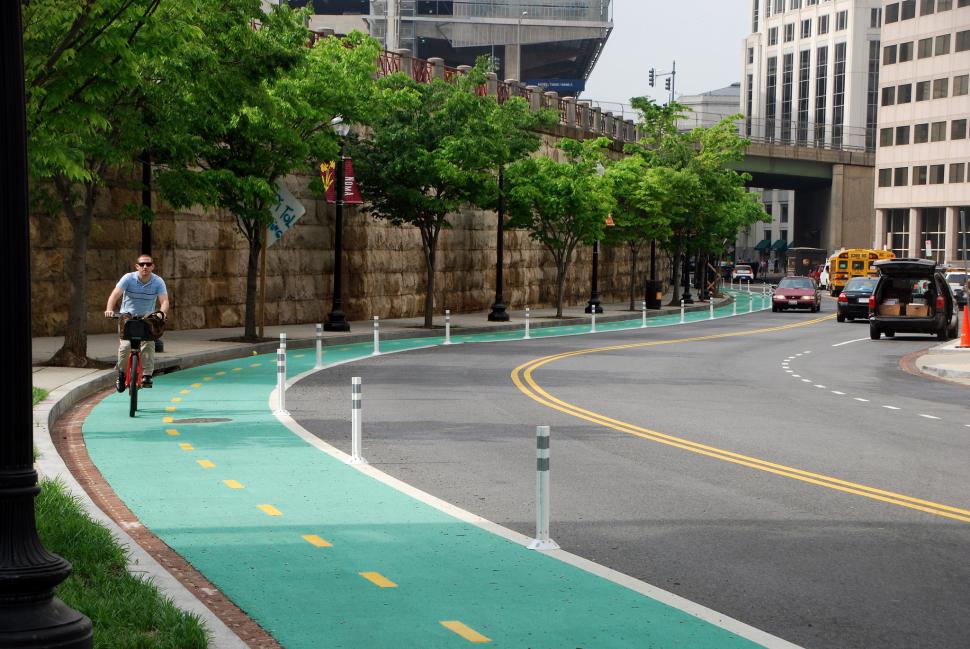
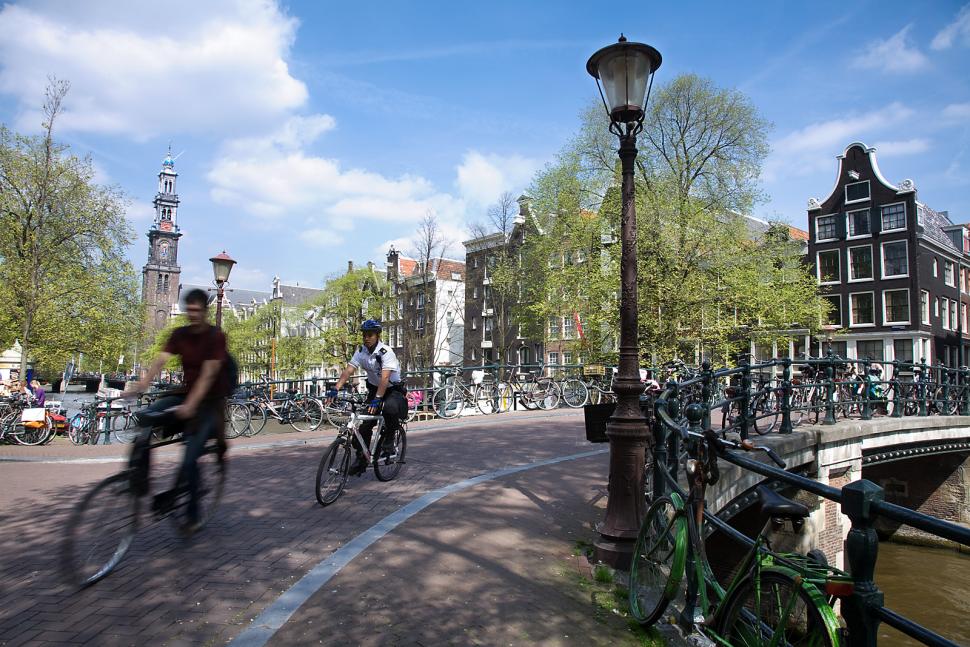
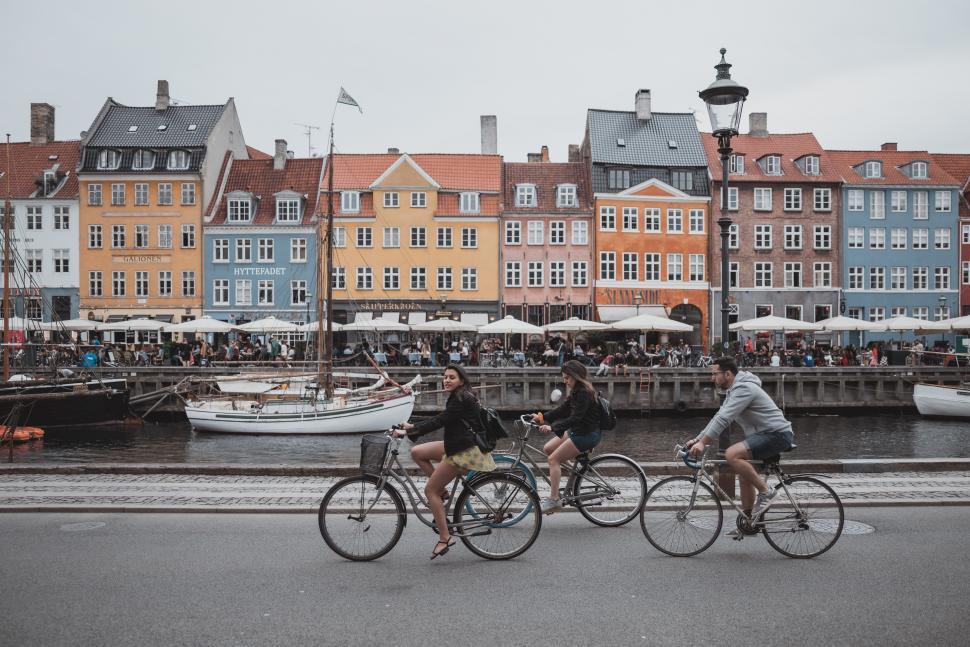
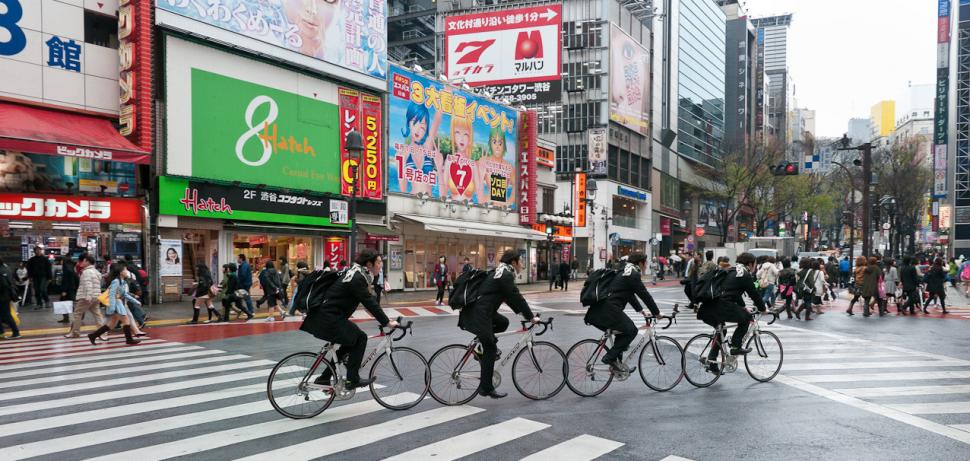
Add new comment
63 comments
The police will still do this and they even have an indelibe pen so no need to hammer a number into your carbon frame.
Carbon frames did for that, now there will be a serial number sticker somewhere - quite long lasting and the bike is suspect if missing. I've got an RFID tag in one of my bikes.
When I was a kid everyone by law had to have a license for their dog (if they had one) and it ended in 1987.
It ended because it was pretty much impossible to enforce (the Police had better things to do with their time) and most people simply did not bother or could not afford the cost, also the administration of the licence cost far more than the amount of revenue it raised.
If your dog bit someone and they got reported, the owner would frantically run up to the post office to pay the license fee before the Police caught up with them or you could even borrow someone elses license, I know someone who did this (that's how stupid it was!).
Also take into account that according to the AA, over 1 in 40 motorists successfully drive without a license, how are they going to catch cyclists?
Fast forward to 2022 and cycling licenses would be equally as stupid, pointless, costly and pretty much impossible to enforce by an already over stretched Police force.
No doubt the average Daily Mail reader would cream their pants at this sort of thing but they are only a very small insignificant percentage of the population and most sensible people realise how ridiculous and poinless this would be as well as the Government having to increase everones taxes to pay for the scheme.
37.5p (7/6d).
I suspect the sort of people that didn't need them got them, and the ones that needed them didn't.
LICENCE in the UK.
Licence, noun; license, verb. Licensed is a verby thing.
There is one mis-spelling I have spotted, but generally the article is in British English.
Licence is spelled in the correct British English form throughout; licensed is an adjective and licensing is, in the examples used, a gerund, which both take an s in British English. If one was to be pedantic about anything it's that maybe the direct quotes from American sources should have used the American spelling.
I see what you've done there: deliberate error in not using the subjunctive voice in order to underline the grammatical point. Very clever rhetoric.
Well done Pike, I was wondering who'd be the first to spot that...
(In my defence I've had a long ride and a couple of beers to end it...)
You missed the North Korea error. You do realise that by that one mistake, the rules of the Internet mean that I am allowed to discredit anything you have ever written?
Yep, that's me scuppered!
In Belgium we used to have them until (I believe) about 1986. I still remember having one on my bike as a young kid. It started as a registration system at the beginning of the 20th century but after the 1950's it turned into a tax, with the (yearly renewable but individually numbered) plate showing that the bicycle tax had been paid.
The system was abolished because its administration cost more than what it generated in revenue. It also wasn't effective in preventing theft as there was no link whatsoever between the bicycle brand/type and the plate so all a thief needed to do was get rid of the affixed plate and bolt on a new one. Riding without a plate at all was not a good idea, especially in rural areas. There were cops that actually patrolled and checked the small stuff. And the system was based per province (+- county in the UK) so if the plate province didn't match with where you lived (compulsory id from the age of 12 on) then questions were asked.
All of this was, of course, back in the day when bicycle theft was still relatively rare and most bikes didn't cost an arm and a leg anyway.
I'd be all in favor of some type of VIN-system on a frame+ a plate linked to that VIN and the owner.
That's interesting, we lived in Brussels (Woluwe St.Pierre as it happens, home suburb of a certain E.Merckx!) because my old man was a diplomat there at the time from 1974-1978 and I never heard of it, certainly my sisters and I were never stopped and asked and we were out on our bikes every day pretty much. Was it adults only?
They knew you had diplomatic immunity...
At the time, Brussels was still part of the unitary Brabant province, I also lived there. A.f.a.i.k. it applied to bikes travelling on public roads, irrespective of the age of the rider but obviously I don't have the statute next to me . I know my bike certainly had them (but I lived in Lennik at the time, 20 km from Brussels and very rural back then). No idea why you were never checked, perhaps the cops in Brussels didn't really bother (in the 80's they certainly had other fish to fry, with a roaming crime gang that killed 28 people during robberies and were never caught). I do remember at least one check that was organised by the cops at school exit one day, with everyone who didn't have a tag receiving a note for the parents + a fine.
. I know my bike certainly had them (but I lived in Lennik at the time, 20 km from Brussels and very rural back then). No idea why you were never checked, perhaps the cops in Brussels didn't really bother (in the 80's they certainly had other fish to fry, with a roaming crime gang that killed 28 people during robberies and were never caught). I do remember at least one check that was organised by the cops at school exit one day, with everyone who didn't have a tag receiving a note for the parents + a fine.
Here's a pic (grabbed off the net) of one:
Very interesting, I must ask the folks if they were aware of it.
W St.P was a very safe, low-crime neighbourhood in my time (this was before the Brabant Gang had started), I can't recall ever having seen a police officer around - maybe we just got lucky!
I remember seeing triangular metal plates attached to front forks when I used to stay with my grandparents in Geraardsbergen in the 1950s.
I didn't realise that the system lasted into the 1980s. I guess it was a way to raise tax revenue, few people had cars and Flanders was quite poor until it began to benefit from EU money.
Let's suppose for a moment the system is financially self-supporting - revenue exceeds direct cost of implementation. How does it help anyone identify an errant cyclist? Will the hapless victim ask the cyclist to hold still a moment whilst they grovel beneath the bottom bracket to garner the mud-caked VIN? Or will they be quick enough with their 100Mpixel camera to capture a readable image of the reg plate as the scoundrel flees?
The whole idea is preposterous. It is nothing but a stick to beat cyclists with, pushed by people who hate cyclists and revel in the thought of enmeshing them in red tape and tax simply to add some misery.
Anything that reduces cycling harms us all. Increased health costs to the NHS (yes, that's hard working tax payers to you and me) and businesses, increased road congestion, increased environmental costs. None of which will be defrayed by a cycling tax.
Whatever I say and whatever arguments are advanced, you will never be convinced so I'd rather skip the effort and go on a ride while the sun shines over here. I don't accept your argument but I'm not in the UK and frankly, whatever is decided there about cycling rules doesn't concern me in the least. Good luck, with your politicians you'll need it.
I wasn't arguing against any of your points in favour of registration. I couldn't because you don't make any! You say it existed previously in Belgium, it was financially unviable, and failed as a theft deterrent, but that nevertheless the police were able to divert resource to enforcing it. You conclude that you'd be all in favour of it coming back.
You'd have to ask policemen who served at the time but I do think that the controls they performed had more to do with the fiscal aspect (as I said, all a thief had to do was remove the tag and affix one registered to himself).
But on a separate and more contemporary point, yes, I would be in favour of compulsory registration of bikes, with a license plate attached to the bike (same as what already applies to speed pedelecs, at least in Belgium). The license plate would be coupled to the bike owner AND to an individual bike VIN-number. If you sell the bike, you'd have to transfer ownership officially. Won't do much for component theft but if the frame is registered and the police perform checks it'd at least allow for identification, which is more than the present situation. And it would allow police to more easily identify cyclists breaking the law.
Saving you some effort to bring me down: I ride about 12k km/year, commute every weekday on a bicycle and don't own a car. And I'm all in favour of improving road security for cyclists and for more people cycling. But cyclists too have to follow the law.
I've no intention to "bring you down". I am interested in your experience of living with an actual bike registration scheme, reg plates and all.
You suggest it could be improved to help counter theft. Maybe so, and voluntary schemes exist (I use Bikeregister.com), but I don't see this as a reason to burden cyclists with mandatory registration.
You suggest it has operated as little more than a "stamp duty" exercise to raise revenue, where the licence plate is merely the "stamp" that proves the tax has been paid. I see no benefit for the reasons already given.
The bit that intrigues me is that it would "allow police to more easily identify cyclists breaking the law". How? You really can't read these plates at a distance. So they need to have hold of the offender to begin with, at which point the police are well versed in determining identity without a registration number. If they're not then you're actually making an argument for pedestrian registration plates - aka universal compulsory ID cards.
Surely you're joking. About 20 speed pedelec (already required to have a plate) users/day are fined for various infractions -mostly running red lights or exceeding the 30 kmph speed limit in the city center- after registration by traffic cameras over here.
And we already have compulsory id cards here since afaik forever: every person over 12 years of age going out in public is obliged by law to carry id at all times and produce it if asked by a law enforcement officer (essentially police, customs and staff who control tickets on public transport but the latter only if a traveller is unable to show a valid ticket). Not being able to show the card is grounds for administrative detention which may not exceed 12 hours and enables police to establish your identity.
Well, I've learnt something there - never knew these bicycle plates were readable at any distance. Thank you for that.
I'm not sure if it exists in the UK or what the license plate looks like but for a speed pedelec we're talking about this in Belgium:
Camera's don't have a problem with these as far as resolution/image clarity is concerned. Wouldn't bother me if it were manadatory on all bicycles but then it only makes sense if as you say there is a standardised and universal approach regaring VIN-numbers and if the police are making it a priority. It's gotten so bad here in Brussels that just before the holidays I received a note from my bicycle theft insurer that starting from January 23, they would no longer be able to cover theft in the Brussels capital region, irrespective of how/where the bicycle was left (except in the own home behind a locked door and if there are signs of burglary).
In the UK it looks exactly like the one shown in this article - VX67DXC is an S-pedelec. Essentially S-pedelecs are motorbikes and have the same type of number plate and all the same laws apply (this one has an overdue MOT https://www.check-mot.service.gov.uk/results?registration=VX67dxc)
You state you are not against the use on push bikes, however are you happy to deal with the consequences of enforcing such a scheme?
It universally results in a decrease in rider numbers and rider distance. Not for you, maybe, but for the population as a whole.
This increases motor vehic,e traffic, in every case, and decreases population health (physical and mental) and cost to health systems.
Does your proposed systems benefits outweigh these known, expected costs?
I'm wondering how this meshes with the Vienna Convention 1968? It doesn't say anything about requiring registration for pedal cycles (thought it does require a bell).
If it's the theft issue can't we just have someone like Priti Patel come out and say they'll make stealing illegal? Maybe everyone has to show a receipt for anything they're found with? That should fix it.
Pages